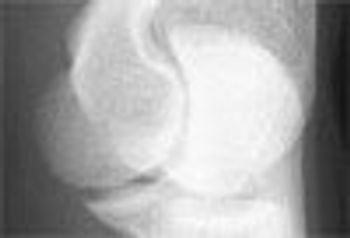
High blood pressure in an infant can be the presenting sign of serious illness. Here’s a road map for how to proceed-from making the diagnosis to finding and treating the cause.

High blood pressure in an infant can be the presenting sign of serious illness. Here’s a road map for how to proceed-from making the diagnosis to finding and treating the cause.

When immigrant families enter your practice, their legal status affects every aspect of their health care. This primer on immigration law will help you understand their problems and provide care that meets their needs.



This 5-year-old girl with multiple congenital abnormalities presented for a routine checkup. She was born with Apert syndrome, also known as acrocephalosyndactyly.A peaked head, sloping eyes, and "mitten hands" are typical features.

A 16-year-old boy is concerned that his right index finger looks "odd." The finger is several centimeters longer than his left index finger, and it is also wider. The boy's mother reported that the finger had always seemed to be a little larger than the others, even when the patient was an infant, but no one paid it much attention.

A 9-week-old Caucasian infant is brought to the primary care physician for evaluation of purpura and petechiae. His parents noted the bruising the previous night, which grew progressively worse throughout the next day. The lesions seemed to appear "out of the blue" without apparent cause, including trauma.

An otherwise healthy 16-year-old girl presented with medial arm pain after falling on her left elbow while skating. Robert P. Blereau, MD, and Timothy J. Haley, MD, of Morgan City, La, write that a radiograph of the left upper arm showed a spur projecting from the distal humerus; there was no fracture or dislocation.






The bad news: No easy or standardized treatment exists to prevent complications of asthma in very young children. The good news? Research is pointing the way to improved therapy.

Parents worry when children don't eat. Once you've ruled out underlying problems, offer reassurance and simple strategies to reduce mealtime stress. Includes a Guide for Parents.








Children and the federal budget, FDA woes, and a call to standardize CAM



Wheezing is common in children younger than 5 years, but asthma is hard to diagnose in this age group. Research holds promise for earlier identification, before uncontrolled symptoms lead to complications.

Your awaited transfer from a small community hospital has finally arrived at the end of the day: a 14-month-old boy with persistent poor feeding and a need for intravenous fluids to maintain hydration.

How can child abductions be averted? Should pediatricians accept some responsibility for preventing them?

Part of the care you give is helping parents create a safe, hazard-free environment for their children by discussing a variety of age-appropriate topics at health-maintenance visits. Yet, despite attention given by the national press to the threat of child abduction in recent years, little discussion has taken place about the role pediatricians can play in preventing abduction, as well as in facilitating retrieval of children who are taken. That's surprising, considering the traditional role we have assumed for children and their families.